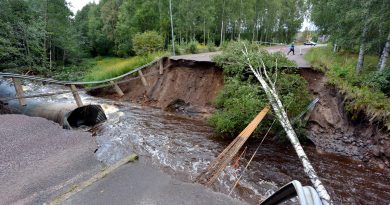Reinforcements, better weather, expected to help fight against wildfire in northern Alberta
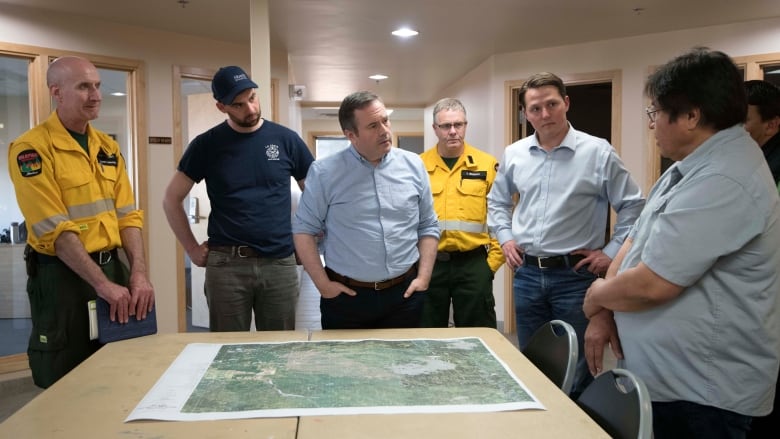
Crews battling wildfires in northwestern Alberta are getting help today from hundreds of new firefighters making their way from other provinces — and from the weather.
British Columbia (West Coast) is sending 267 wildfire service personnel, including 230 firefighters plus supervisors and an incident manager.
The first group arrives today, and the remainder should be on site on Thursday, said a statement from the B.C. Wildfire Service. More help is also on the way from Ontario (South) and Nova Scotia (Atlantic).
The massive, out-of-control Chuckegg Creek Wildfire, burning approximately five kilometres south of High Level, Alta., has grown to 80,000 hectares with the main area of spread on the northwest side away from town. High Level is 450 kilometres north of Grande Prairie.
The extra help will bolster the current forces and allow exhausted firefighters and support staff to rest, Derek Gagnon, an Alberta Wildfire information officer, told CBC News Wednesday.
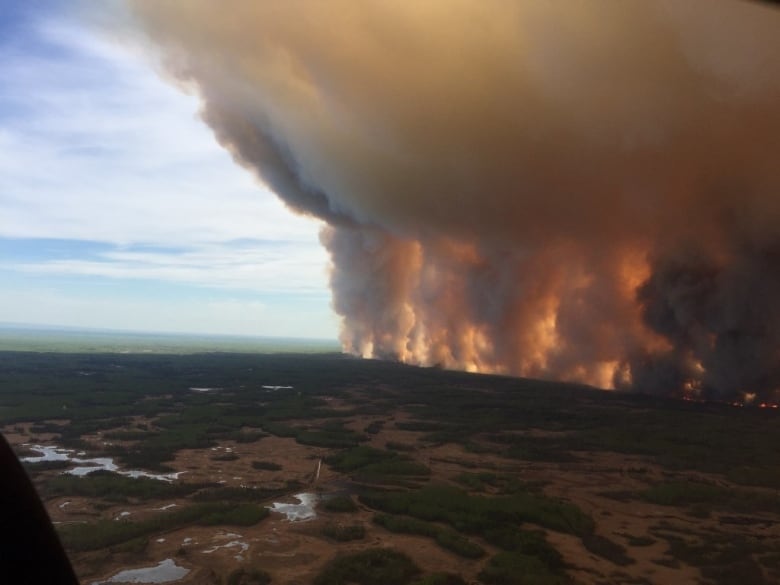
“The intent is to replace but also to replenish,” Gagnon said.
“And it’s not just firefighters who will be replaced here, it’s also support staff who have been working extremely long hours behind the scenes.”
With the unpredictable nature of wildfires, the B.C. Wildfire Service gave a nod to the importance of provinces supporting each other when the need arises. It noted the “invaluable assistance Alberta has provided to B.C. during the last two wildfire seasons, which were the worst in the province’s history.”
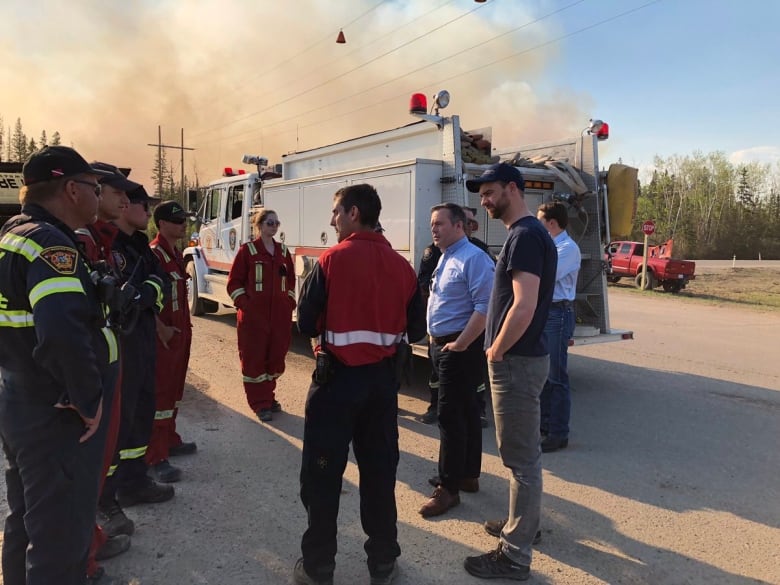
Despite heavy smoke, officials say a lighter wind out of the northeast and a slight increase in the relative humidity has allowed for great progress on reining in the wildfire, which forced about 5,000 out of their home on Monday.
“Both of these things are going to lessen the fire intensity, which is good news for our firefighters out there,” Gagnon said.
About 800 people have registered with the government, advising them that they are safely out of the community in Slave Lake, about 500 kilometres away, La Crete and other communities.
Mayor concerned for seniors
However, the government is still urging all evacuees to check in one of the five registration centres in the province.
High Level Mayor Crystal McAteer is particularly concerned about residents of White Spruce Village, a housing development for independent seniors.
“I have some concerns about the residents of White Spruce Village,” McAteer wrote in a Facebook post late Tuesday. “So far, only two seniors have registered at the evacuation centres.”
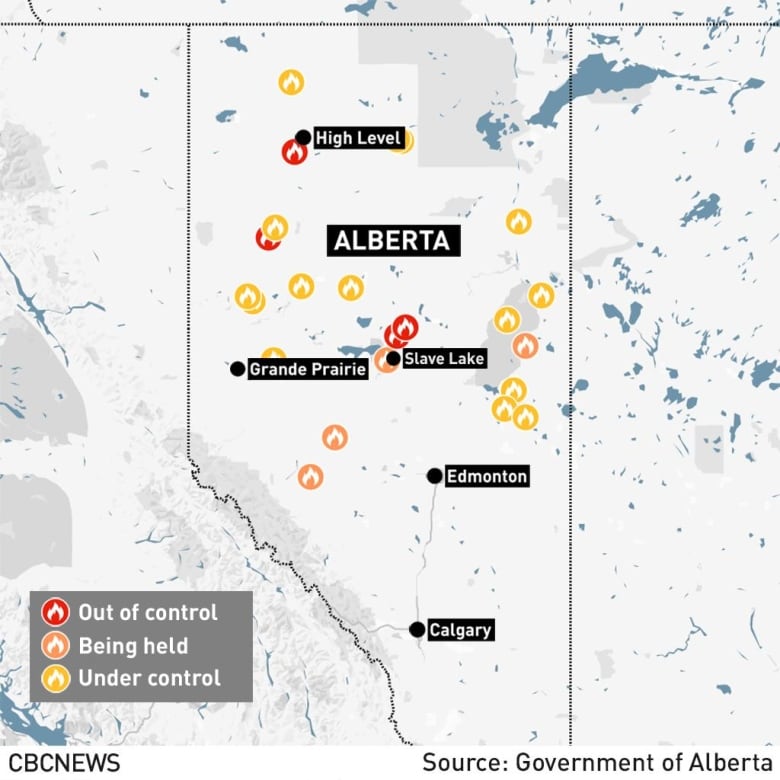
McAteer also noted that there are volunteers in High Level who will check on pets that were left behind. Residents can call the town at 780-926-2201 to request assistance, she said.
The centres are located at the Slave Lake Legacy Centre, the High Prairie Sports Palace, Grande Prairie Regional College, Peace River Misery Mountain Ski Hill and the La Crete Heritage Centre.
Evacuees still looking for a place to stay should head to High Prairie, Grande Prairie or Peace River. Slave Lake hotels are full.
Provincial fire officials on Tuesday were grateful for winds that have been pushing the fire away from the community, and they expected that to continue for the next few days.
Environment Canada said winds should be light this morning but with gusts reaching 40 km/h.
The wind will push smoke into the Peace River region, which will cause poor air quality and reduced visibility.
Grande Prairie, 450 kilometres south, is expected to experience the smoke by Thursday, Environment Canada said in an air quality statement.
Gagnon said that while the weather is helping, conditions are still desperately dry and the fire danger for the region is still high.
“It’s been so hot and dry, that just because the wind is a little bit less, the things that can still start wildfires — those fine fuels, those grasses — still exist. So the danger is still very much there.”
On Tuesday, McAteer said evacuees should be prepared to be gone from their homes for up to five days, because power service is disrupted in High Level and La Crete.
Atco said more than 50 employees and contractors are working to restore service, but warned it could be intermittent over the next few days.
Late Tuesday, it managed to restore provisional electricity to High Level and expected to get La Crete and other nearby communities back online by midnight.
“Due to the unpredictable nature of the fire, power restoration may be intermittent over the coming hours and days. Large-scale backup generation is currently being secured and should be available by the end of the week to support priority operations as determined by the town and region,” the company said in a statement.
Related stories from around the North:
Canada: Government warns against ‘carelessness’ following manmande fires in Canada’s central Arctic, CBC News
Russia: Forest fires rage across Barents region (July 2018), The Independent Barents Observer
Sweden: Is Sweden better prepared after last year’s historic wildfire season?, Radio Sweden

